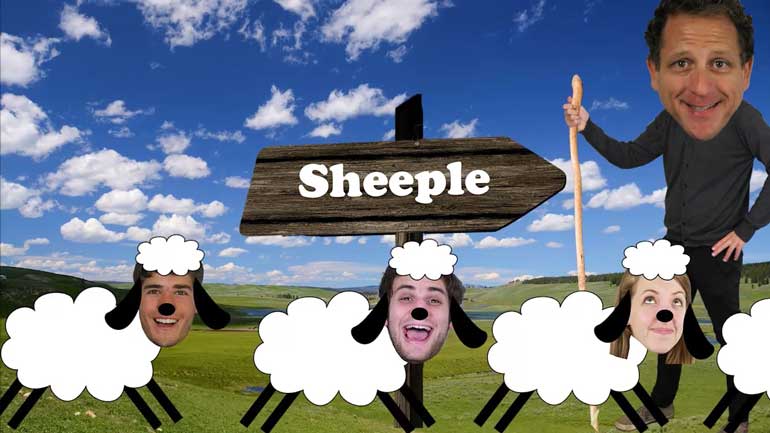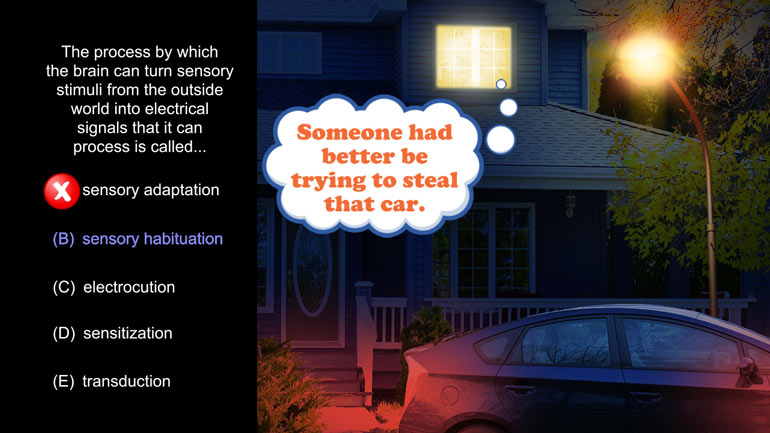ShmoopTube
Where Monty Python meets your 10th grade teacher.
Search Thousands of Shmoop Videos
AP Psychology 2.3 States of Consciousness 24 Views
Share It!
Description:
AP Psychology 2.3 States of Consciousness. What is the suprachiasmatic nucleus?
Transcript
- 00:03
And here's your shmoop du jour brought to you by the
- 00:05
suprachiasmatic nucleus not to be confused with the [Mary Poppins holding an umbrella]
- 00:11
supercalifragilisticexpialidocious nucleus which yeah doesn't exist.. Okay
- 00:16
here's our question what is the suprachiasmatic nucleus, and here are your potential
- 00:22
answers...Alright well if you don't know what the schmoop-a-
Full Transcript
- 00:29
suprachiasmatic nucleus is, well we'll give you a hint it has to do with sleep too [Girl sleeping]
- 00:36
bad you can't really tell that by the name much like the word corn dogs [Girl taking a corn dog for a walk in park]
- 00:39
wouldn't eat one of those for years okay well anyway let's run down exactly
- 00:44
what each of our answers is referring to until we find the one we're looking for
- 00:47
start with B) is the suprachiasmatic nucleus a series of brain waves that signal
- 00:54
fatigue, well let's see - we have five types of brain waves gamma, beta, alpha,
- 00:58
theta and delta all naturally produced in varying quantities throughout the day [Examples of varying brain waves]
- 01:03
and typically signaling different things the short ones that signal drowsiness
- 01:06
those would be the theta waves, not a suprachiasmatic nucleus so B) is not our
- 01:12
answer and while we're on the top of the waves let's bring up E) in contrast to [Person surfing on a wave]
- 01:16
the short theta waves the tall waves that suggest wakefulness are the beta
- 01:20
wave well between theta waves beta waves and three others there's simply no
- 01:24
suprachiasmatic waves, so E) is out too what about C) is a suprachiasmatic [Beta wave talking to a sleepy theta wave]
- 01:30
nucleus a gland that produces melatonin a naturally occurring hormone that helps
- 01:35
you control your sleep and wake cycles well while melatonin is produced by
- 01:40
various tissues in the body the primary manufacturer is the pineal gland in the [pineal gland highlighted in the brain]
- 01:44
brain not the suprachiasmatic nucleus and therefore not our answer moving on
- 01:49
to D) well actually looks like we've got that one covered as well again the
- 01:53
pineal gland produces melatonin not the suprachiasmatic nucleus like not at all
- 01:57
that leaves us with A) is the suprachiasmatic nucleus a grouping of
- 02:01
cells located in the hypothalamus that controls sleep patterns while the SCN [Man digging crops]
- 02:06
control sleep patterns and works with environmental clues
- 02:09
order to determine an appropriate sleep schedule it also controls our circadian [Man with a clock on his forehead ticking]
- 02:13
rhythm or in other words our body's internal clock... Well, a clock that tells
- 02:18
us when it makes sense to go to sleep which is really just a suggestion is what
- 02:23
it is but no need to listen to it we can stay up watching youtube videos till 4am [Man watching videos at 4am]
- 02:26
and still feel fresh as a daisy by seven right? [Man turns into a zombie and walks away]
Up Next
AP Psychology 2.2 Social Psychology. Which of the following was an independent variable manipulated in Asch's research?
Related Videos
AP Psychology 1.1 Personality. According to Freud, these three parts of personality are constantly in conflict.
AP Psychology 1.1 Sensation and Perception. The process by which the brain can turn sensory stimuli from the outside world into electrical signals...
AP Psychology 1.1 Social Psychology. Which of the following best describes social psychology?
AP Psychology 1.1 States of Consciousness. Who conducted research on REM sleep deprivations?




